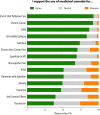Knowledge, experiences, and attitudes of Australian General Practitioners towards medicinal cannabis: a 2021-2022 survey
- PMID: 36529730
- PMCID: PMC9760535
- DOI: 10.1186/s12875-022-01946-x
Knowledge, experiences, and attitudes of Australian General Practitioners towards medicinal cannabis: a 2021-2022 survey
Abstract
Background: Medicinal cannabis (MC) products have been available on prescription in Australia for around six years. General practitioners (GPs) are at the forefront of MC prescribing and recent years have seen substantial increases in prescription numbers. This study examined the current knowledge, experiences, and attitudes of Australian GPs around MC. We also compared our findings to those of an earlier 2017 investigation.
Method: We conducted a cross-sectional study using a 42-item on-line questionnaire adapted from our earlier 2017 survey. The current survey was completed by GPs attending an on-line, multi-topic educational seminar. Australian GPs (n = 505) completed the survey between November 2021 and February 2022. Data were synthesised using descriptive statistics. MC 'prescribers' and 'non-prescribers' responses were compared using Pearson's χ2 tests.
Results: While most GPs (85.3%) had received patient enquiries about MC during the last three months, only half (52.3%) felt comfortable discussing MC with patients. Around one fifth (21.8%) had prescribed a MC product. GPs strongly supported MC prescribing for palliative care, cancer pain, chemotherapy-induced nausea and vomiting, and epilepsy, more so than in our 2017 survey. Prescribing for mental health conditions (e.g., depression, anxiety) and insomnia received less support. Opioids, benzodiazepines, and chemotherapy drugs were rated as more hazardous than MC. GPs correctly endorsed concerns around Δ9-tetrahydrocannabinol-related driving impairment and drug-seeking behaviour. However, additional concerns endorsed around cannabidiol causing addiction and driving impairment do not agree with current evidence. Consistent with this, many GPs (66.9%) felt they had inadequate knowledge of MC.
Conclusion: Acceptance of MC as a treatment option has increased among Australian GPs since 2017. However, there is a clear need for improved training and education of GPs around cannabis-based medicines to provide increased numbers of skilled prescribers in the community.
Keywords: Cannabinoid; Cannabis; Doctor; General practice; Medicinal cannabis.
© 2022. The Author(s).
Conflict of interest statement
Authors ZB and DM declare they have no financial interests. ISM has received honoraria from Janssen, is currently a consultant to Kinoxis Therapeutics, and has received research funding and fellowship support from the Lambert Initiative, NHMRC and Australian Research Council. He holds a variety of patents for non-cannabinoid therapeutics. This survey was conducted at an online seminar run by Healthed and RM is the CEO of Healthed.
Figures





References
-
- Federal Register of Legislation. Narcotic Drugs amendment Act, No.12. Canberra, Australia: Australian Government; 2016. Available from: https://www.legislation.gov.au/Details/C2016A00012. [Accessed 16 Aug 2022].
-
- Kotsirilos V, McGregor IS. Medicinal cannabis: Where are we? Insights+; 2021. Available from: https://insightplus.mja.com.au/2021/7/medicinal-cannabis-where-are-we/. [Accessed 10 Aug 2022].
-
- Therapeutic Goods Administration. Medicinal cannabis products by active ingredients. Canberra, Australia: Australian Government Department of Heath; 2021. Available from: https://www.tga.gov.au/medicinal-cannabis-products-active-ingredients. [Accessed 28 Mar 2022].
-
- Therapeutic Goods Administration. Medicinal cannabis Special Access Scheme Category B data. Canberra, Australia: Australian Government Department of Heath; 2022. Available from: https://www.tga.gov.au/medicinal-cannabis-special-access-scheme-category.... [Accessed 10 Nov 2022].
Publication types
MeSH terms
Substances
LinkOut - more resources
Full Text Sources
Medical
